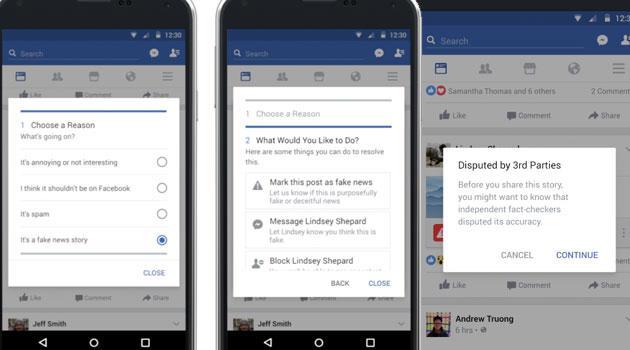Facebook wants to combat online hoaxes through expert fact-checking

The Facebook social networking site is designing many instruments for preventing the dissemination of fake news or hoaxes, according to company vice-president John Hegeman, who announced the decision in New York. Facebook users will have the option of flagging untrue news items more easily than they do now, and facts that are called into question will then be verified by teams of experts including the ABC News television station in the USA and the Associated Press wire service.
If a larger amount of people flag a post shared on Facebook as a false news item, or if more people share an article after just reading its headline and not clicking through to the entire piece, Facebook will receive a signal that the item in question could have unreliable content and will deliver it to a third party for fact-checking. Experts in fact-checking will review the item and if discrepancies of fact are confirmed, the item will be flagged as “disputed”, and clicking on it will explain the reservations fact-checkers have about it.
Untruthful news items will not, however, be deleted, as the network would like to avoid allegations of censorship. It will not be possible to support content that has been flagged as “disputed” by buying advertising to accompany it, and Facebook will also restrict its further organic dissemination.
“We believe people must have the right to express themselves, and it is not our place to become the judges of what is and is not true. Therefore, we are approaching this problem cautiously,” Adam Mosseri, another Facebook vice-president, said.
“We have focused on the worst of the worst items, on the clear hoaxes and untruths disseminated by spammers who make a profit doing this. We are using the aid of our own community and third parties to do this,” Mosseri said.
The social network will collaborate in the USA with the websites associated in the International Fact-Checking Network, such as FactCheck.org, Politifact, and several media domains such as ABC News and the Associated Press. Facebook also wants to prevent fraudsters from posing with the domain names of actual media outlets.
The company has recently been exposed to criticism for its benevolent approach to fake news, more of which turned up on the Internet during the US presidential election campaign. Surprised American Internet users were reading fake news items alleging, for example, that Pope Francis supported Republican candidate Donald Trump, or that a federal agent investigating Democratic candidate Hillary Clinton’s e-mail scandal had been found dead.
The Pew Research Center, which performs sociological research in the United States, reported yesterday on the results of a survey according to which almost one-fourth of all American Internet users had reposted fake news items, whether consciously or unconsciously. According to two-thirds of those surveyed, such information causes confusion about the basic facts of ongoing current events.
